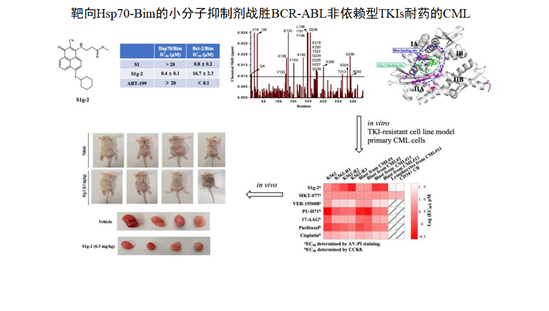
Leukemia: Small-molecule inhibitor targeting the Hsp70-Bim protein–protein interaction in CML cells overcomes BCR-ABL-independent TKI resistance
Authors: Ting Song, Yafei Guo, Zuguang Xue, Zongwei Guo, Ziqian Wang, Donghai Lin, Hong Zhang, Hao Pan, Xiaodong Zhang, Fangkui Yin, Hang Wang, Laura Bonnette Uwituze & Zhichao Zhang
Abstract
Herein, we screened a novel inhibitor of the Hsp70-Bim protein-protein interaction (PPI), S1g-2, from a Bcl-2 inhibitor library; this compound specifically disrupted the Hsp70-Bim PPI by direct binding to an unknown site adjacent to that of an allosteric Hsp70 inhibitor MKT-077, showing binding affinity in sub-μM concentration range. S1g-2 exhibited overall 5–10-fold higher apoptosis-inducing activity in CML cells, primary CML blasts, and BCR-ABL-transformed BaF3 cells than other cancer cells, normal lymphocytes, and BaF3 cells, illustrating Hsp70-Bim PPI driven by BCR-ABL protects CML through oncoclient proteins that enriched in three pathways: eIF2 signaling, the regulation of eIF4E and p70S6K signaling, and the mTOR signaling pathways. Moreover, S1g-2 progressively enhanced lethality along with the increase in BCR-ABL-independent TKI resistance in the K562 cell lines and is more effective in primary samples from BCR-ABL-independent TKI-resistant patients than those from TKI-sensitive patients. By comparing the underlying mechanisms of S1g-2, MKT-077, and an ATP-competitive Hsp70 inhibitor VER-155008, the Hsp70-Bim PPI was identified to be a CML-specific target to protect from TKIs through the above three oncogenic signaling pathways. The in vivo activity against CML and low toxicity endows S1g-2 a first-in-class promising drug candidate for both TKI-sensitive and resistant CML.

https://www.nature.com/articles/s41375-021-01283-5